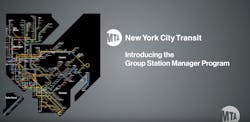NYCT marks first full year of new station management program
New York City Transit (NYCT) has completed a full calendar year with its new station management program, with statistics showing accomplishments for the two dozen group station managers (GSMs).
The GSMs have addressed more than 62,000 maintenance needs, defects and other issues since their hiring in the summer of 2018, in addition to performing comprehensive deep-cleans at more than 100 stations and enhancements at more than 200 stations.
“I brought the Group Station Manager model to NYC Transit after serving in that role in the London Underground and seeing just how helpful it can be to improve station conditions,” said NYCT President Andy Byford. “We have more stations than any subway system in the world and by adding about two dozen uniquely qualified and empowered managers to our station management program we are bringing more accountability and tangible improvements to our customers. I’m very proud of this ace team and their accomplishments.”
During 2019 and the last few months of 2018 when the Group Station Manager program was launched, GSMs have coordinated the resolution of 62,401 maintenance problems, equipment defects, station environment issues and other matters.
Most issues addressed by GSMs – whose job duties include interacting with customers in stations, as well as via email – have related to cleanliness and appearance; equipment and station feature operation and availability (such as MetroCard Vending Machines and lighting); and complaints about employee actions.
The top six categories of station problems addressed by GSMs – in both customer and employee areas – are:
- Lighting – 12,880 issues fixed (including replacement of fixtures and ballasts and all electrical repairs)
- Masonry – 8,813 issues fixed (including repairs to wall tiles, floor tiles, tactile surfaces, stair treads and concrete platform)
- Carpentry – 8,076 issues fixed (including bench repairs, stairwell repairs, other woodwork)
- Plumbing – 7,464 issues fixed (including drain clearing, bathroom repairs, pipe repairs)
- Painting – 5,267 issues fixed (including replacement over graffiti, spot painting, scraping and general painting)
- Tinsmithry – 4,915 issues fixed (including trash canister repair, installation or removal)
GSMs have also helped coordinate the comprehensive deep cleaning at 106 stations and initiated and coordinated significant enhancements at 217 stations across the city. The enhancements included refurbished bathrooms, refurbished employee facility rooms, scraping and painting of various parts of stations, floor and wall tile replacements and detailed cleaning of MetroCard equipment such as turnstiles and vending machines.
Customers have noticed the work of the GSMs. NYCT's quarterly Customer Counts survey finds customer satisfaction with station conditions 5.9 percentage points higher in the fourth quarter of 2019 compared to the same time one year prior.
NYCT says the Group Station Manager program introduces complete accountability and makes station condition fixes more efficient and prolific by ensuring that one person is responsible for all conditions at a station across many different maintenance, repair and quality of life categories. The program also ensures that each manager is responsible for far fewer stations than before. Previously, different managers were responsible for different aspects of a station, with the only official responsible for all station conditions end-to-end being the chief stations officer covering the entire city. The previous system made it very difficult for managers to interact with customers and to personally witness, coordinate and oversee multidisciplinary issues and their resolution. Under the GSM program, about two dozen managers are each responsible for all conditions at 15-20 stations. This much more manageable workload – and comprehensive responsibility – has led to GSMs being able to visit all their stations on a regular basis, meet with customers, personally identify issues and personally oversee work being done, according to NYCT.
